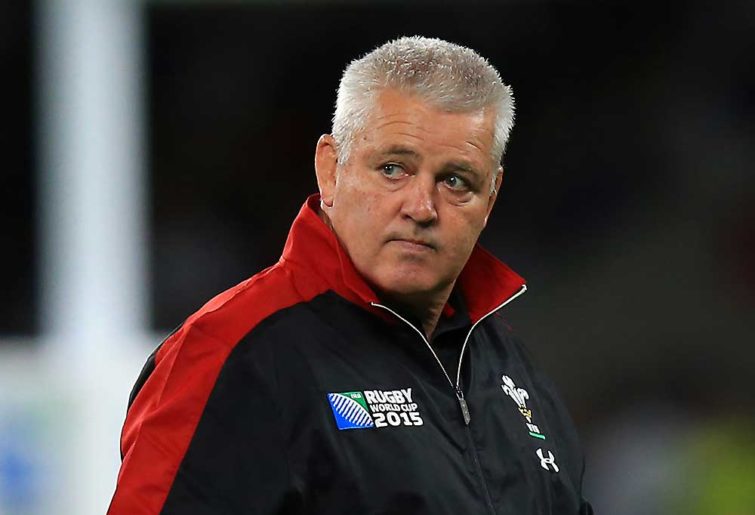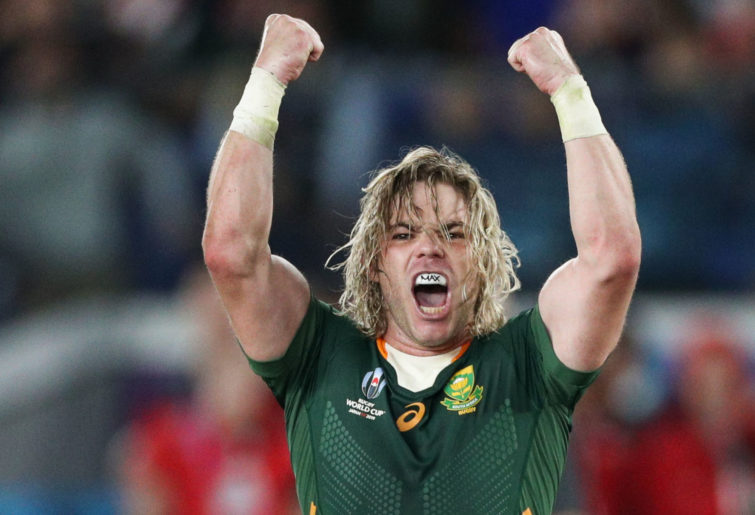Well after a weekend of four hugely entertaining quarter-finals, we’ve had a very big contrast in semi-finals.
On Saturday there was one of the games of the tournament and then on Sunday there was a semi-final that, well, was pretty disappointing.
Neither Wales nor South Africa will be proud of the performance, however the Springboks won’t care one little bit. They are on the way to the final and have a shot at becoming World champions.
So in a game that failed to live up to expectations, what was there to talk about?
Wales needed to find something, anything in attack
Wales came into the World Cup with plenty of people talking them up. They’d won the Six Nations with a Grand Slam sweep of their opposition and had grown better and better during the competition.
Against both Ireland and England they absorbed plenty of pressure before finding ways to strike – usually out wide with some of the back three showing both pace and prowess in the air.
With Jonathan Davies at 13 they had one of the best centres in the game and they seemed to be in a good place.
However in their four wins from four in the Group stages there were signs that the attacking style of the Welsh wasn’t evolving and it relied heavily upon those cross-field kicks.
There were a couple of nicely worked tries putting the ball through hands against Fiji but only once the game had broken up in the last 20 minutes.
Against South Africa they really offered nothing in attack and despite having over 60 per cent of the possession and territory, they could only make seven clean breaks, beat 11 defenders and offload twice in the entire game.
Part of the issue was that they chose to kick so often and then kicked poorly. With their 61 per cent of possession they kicked the ball away 36 times.
When you consider that at the very most they would have had the ball in hand for 48 minutes, that means they kicked almost once per minute, and probably more often than that.
The South African defence was solid for sure – they only missed 11 tackles – but the Welsh just never threatened the Boks.
What will the history books say about Warren Gatland?
Gatland has been present in the international game for a long time and as Welsh coach for 12 years.
He’s an incredibly likeable guy by both the Welsh and opponents and many a fan has wished that their nation would sign him up to lead their team.
But what will people say now that his time with Wales has come to an end? There have been many successes for sure – two semi-finals at World Cups, four Six Nations (including three Grand Slams) and a World No.1 ranking.
Given the small player base of Wales this is pretty impressive but against the tier one nations, and especially the southern hemisphere giants, he’s always struggled.
Under him Wales enjoyed a positive winning ratio against just four of the ten tier one countries (and one of those is Italy). Against Australia, South Africa and New Zealand he averages a win just 15 per cent of the time.
Of course stats only tell one side of a much more nuanced story. He should be applauded for the way he was able to evolve the Welsh team from the infamous “Warren-ball” style into something much more effective and Welsh rugby will miss him dearly.
When it came down to it, he was able to take a team with only a couple of world-class players and take them just four points away from a World Cup final.
He wasn’t able to bring the attacking potency they needed in the end, but Wales became very hard to beat under Gatland in his final year.

(Mike Egerton/PA Wire)
No please, I insist, you first…
There was something almost polite about the way the teams played this match. They still battered each other senseless but both sides seemed to be wanting the other to make the first move.
Instead of attacking hard and taking the game to their opponents, each side seemed worried about making a mistake and so either played safe, tight rugby that was unlikely to unlock a defence at this stage of the competition, or they kicked the ball away and said “go on – you take the risk!”
Both sets of halves struggled to take control of the game even though both had their fair share of ball. Some teams deliberately look to absorb wave after wave of attack from their opponents – backing their defence to withstand the barrage before trusting their counter-attack to jump on a mistake. The Kiwis did it to the Springboks themselves in the opening game of this tournament.
But in this semi-final there wasn’t this confidence from either side. Both seemed very nervous and neither really tried anything too creative to break the deadlock. As the game went on, it got worse as the impact of a mistake could be so much more deadly.
The Welsh will look back with frustration at their lack of attacking intent and accuracy and the Springboks will look forward knowing that they can’t play like that in the final.
Welsh defence in the backs was too slow
Unfortunately for the Welsh, their attack wasn’t the only thing that didn’t really fire in this semi-final. Far too often they let the Springboks’ backs run at them with ball in hand and it caused them problems a good few times.
One example was in the 51st minute. The score was 9-9 at the time and both teams were desperately trying not to make a mistake.
South Africa had the ball and the pass out from Handré Pollard to Damian de Allende was poor – it went just behind the big centre and he had to turn and pretty much stop to take it.
If the Welsh defence had been up on the Boks they could have maybe smashed de Allende and caused real issues for the Boks, or at the very least tackled the centre well behind the advantage line and well away from his forwards.
Instead the Welsh backline was hanging back and waiting for the Boks to run at them. De Allende was able to recover, run forward a good few metres and then had time to place a lovely grubber kick that pinned Wales back deep in their own 22.
As England showed in the first semi-final, defence can create real point scoring opportunities and while a team doesn’t have to rush up in every situation, the Welsh defence seemed more concerned about making a mistake rather than trying to force an error from the Boks.
Springboks need their stars to stand up
Before the tournament began, South Africa were one of the teams picked for potential success. They had a good Rugby Championship with an impressive draw in New Zealand and a demolition of the Wallabies.
With their place secured in the Final they have shown that they deserved that pre-tournament praise.
However, despite at least second place secured, they’ve only really impressed in one key game and that was against Japan.
Against the All Blacks in their opening game they were punished for a couple of moments where they switched off and other than that they’ve been only ‘okay’.
Come the final, if England play the way they did against New Zealand, then South Africa are going to have to play the game of their lives to win and to do that they need every single one of the big names to stand up and have perfect games.
They’ve got the stock for sure – a huge front five, powerful back row, a scrumhalf who can terrorise defences, power in the centres and wingers with some scary pace.
But players like Malcom Marx, Handré Pollard, Faf de Klerk, Eben Etzebeth and Siya Kolisi have really got to impose themselves and dominate England.
Marx has been strangely quiet this year for South Africa and he has to find his spark again. On his day he’s part hooker, part flanker and part centre in attack and defence.
The absence of big performances from him and his teammate s cannot continue.

(Photo by Craig Mercer/MB Media/Getty Images)
Will South Africa change game plans for the final?
Against Japan the Boks quite astutely changed game plans at half time and played a much more direct game to overpower the Japanese.
Against the Welsh they again used power runners in the centre coupled with kicking the leather off the ball to find a way past the Welsh.
As Rassie Erasmus starts to plan how to beat England, what game plan will he look to employ? England showed the importance of taking the game to the opposition and they crossed the try line three times against the All Blacks.
While only one of those tries counted, the fact that Eddie Jones’ men kept taking the game to New Zealand proved crucial and meant the Kiwis struggled to settle into their own rhythm.
The Springboks struggled to find a rhythm against Wales and Wales didn’t look anywhere near as dangerous as England did on Saturday.
However, every team has its weaknesses and Erasmus will have truly earned a hero’s reputation if he can drill his team into unlocking the English.
But what game style will they bring? If they continue to kick a lot hen they need to make sure their box kicks are more competitive and that their territory finders find gaps and grass more often.
If they choose to keep it tight with their big men piling forward then they have to offload a hell of a lot more – another two offloads like in the semi is not going to do it.
If they choose to get it wide and use their pacemen then they have to suck defenders in first and then get quick ruck ball.
Whichever one it is, Faf and Handré are going to be crucial and they are going to need to play a lot better than they did on Sunday.
Does the third-place game still belong?
While all the talk will now be about the Springboks taking on the Red Rose, a thought should be given to the Welsh and Kiwi sides who have to find a way to get over the huge disappointment and battle it out on Friday for the bronze medal.
These players are professionals and they will always want to win but there is something brutal about being asked to take the field again just a few days after such a huge disappointment as a semi-final loss… and for what gain?
Does anyone remember who came third or fourth in previous World Cups? Will fans talk of taking the bronze at Japan 2019 in years to come or will they say that they made their third semi-final?
So why are we asking these heartbroken warriors to put themselves through it? Will fans from back home be watching and will anyone really care about the result?
International rugby is a great thing and this tournament has been wonderful but there’s something that feels out of place about Friday’s game.






























































































